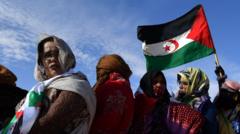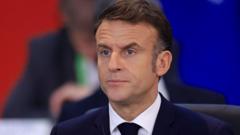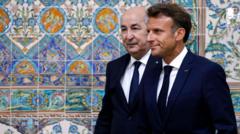Macron’s statements reflect a significant shift in France's foreign policy, igniting debates over colonialism and self-determination for Sahrawi people amidst a complex international backdrop.
France's Support for Moroccan Sovereignty over Western Sahara Sparks Controversy

France's Support for Moroccan Sovereignty over Western Sahara Sparks Controversy
President Emmanuel Macron's endorsement of Morocco's claim over Western Sahara raises tensions in the region.
In a pivotal address to the Moroccan parliament, President Emmanuel Macron expressed his support for Morocco’s claim over Western Sahara, stating that he is in favor of the territory falling under Moroccan sovereignty. This announcement accompanies a pledge for French investment in the region, which is viewed by many as a critical economic support gesture.
Western Sahara, located on Africa's northwestern coast, has been a contentious area since it was a Spanish colony, leading to decades of dispute. Morocco largely administers the territory, while the Algeria-based Polisario Front advocates for the Sahrawi people’s right to an independent state. France's historic status as a colonial power in both Morocco and Algeria adds a layer of complexity to its involvement in the matter.
Macron's recent comments were met with applause from Moroccan lawmakers, reinforcing the narrative of Morocco's claim. This marks a noticeable shift from France's previous stance regarding the issue, where it recognized the need for autonomy but avoided endorsing unconditional sovereignty. By framing Morocco's plan as the "only basis" for a lastingly just resolution, France has joined the ranks of several other nations—including Spain, the U.S., and Israel—in officially backing this stance.
Algeria's government responded to this declaration with displeasure, recalling its ambassador from Paris, and emphasizing its view of Morocco's actions in Western Sahara as an illegal occupation. Tensions have significantly escalated between Algeria and Morocco, particularly since Algeria severed diplomatic ties in 2021, fearing Moroccan espionage activities against Algeria's leadership.
Macron cautiously touched on the topic of colonialism during his address, acknowledging the darker chapters of France's colonial history without delivering a formal apology. This recognition may signal France's desire to address historical grievances while navigating current political dynamics.
During the state visit, Macron and Moroccan officials reportedly struck several agreements related to energy and infrastructure, amounting to a potential $10.8 billion investment package aimed at bolstering ties. Macron also promised commitments to "sustainable support initiatives" for the local communities in Western Sahara.
Reactions from the Polisario Front condemned France's support for Morocco, claiming it exemplifies violent and unlawful occupation. Despite an existing UN-brokered ceasefire since 1991, the situation remains unresolved, with plans for a self-determination referendum yet to materialize due to ongoing disputes about eligibility and execution.
In summary, France's endorsement of Moroccan claims over Western Sahara reflects a strategic pivot in its diplomatic relations, simultaneously stoking tensions with Algeria and reigniting discussions about historical colonial injustices and the rights of Sahrawi people.
Western Sahara, located on Africa's northwestern coast, has been a contentious area since it was a Spanish colony, leading to decades of dispute. Morocco largely administers the territory, while the Algeria-based Polisario Front advocates for the Sahrawi people’s right to an independent state. France's historic status as a colonial power in both Morocco and Algeria adds a layer of complexity to its involvement in the matter.
Macron's recent comments were met with applause from Moroccan lawmakers, reinforcing the narrative of Morocco's claim. This marks a noticeable shift from France's previous stance regarding the issue, where it recognized the need for autonomy but avoided endorsing unconditional sovereignty. By framing Morocco's plan as the "only basis" for a lastingly just resolution, France has joined the ranks of several other nations—including Spain, the U.S., and Israel—in officially backing this stance.
Algeria's government responded to this declaration with displeasure, recalling its ambassador from Paris, and emphasizing its view of Morocco's actions in Western Sahara as an illegal occupation. Tensions have significantly escalated between Algeria and Morocco, particularly since Algeria severed diplomatic ties in 2021, fearing Moroccan espionage activities against Algeria's leadership.
Macron cautiously touched on the topic of colonialism during his address, acknowledging the darker chapters of France's colonial history without delivering a formal apology. This recognition may signal France's desire to address historical grievances while navigating current political dynamics.
During the state visit, Macron and Moroccan officials reportedly struck several agreements related to energy and infrastructure, amounting to a potential $10.8 billion investment package aimed at bolstering ties. Macron also promised commitments to "sustainable support initiatives" for the local communities in Western Sahara.
Reactions from the Polisario Front condemned France's support for Morocco, claiming it exemplifies violent and unlawful occupation. Despite an existing UN-brokered ceasefire since 1991, the situation remains unresolved, with plans for a self-determination referendum yet to materialize due to ongoing disputes about eligibility and execution.
In summary, France's endorsement of Moroccan claims over Western Sahara reflects a strategic pivot in its diplomatic relations, simultaneously stoking tensions with Algeria and reigniting discussions about historical colonial injustices and the rights of Sahrawi people.



















